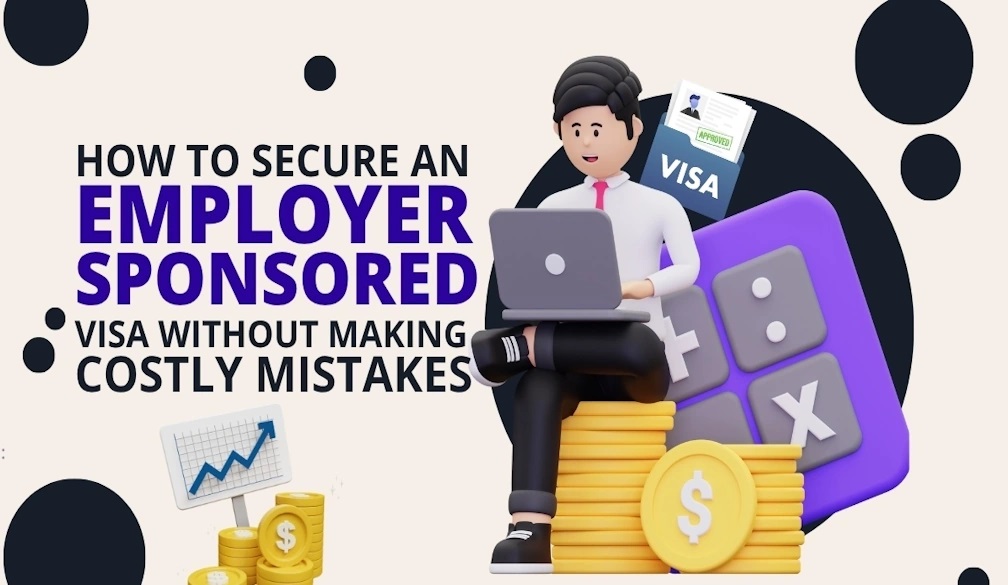How to Secure an Employer Sponsored Visa Without Making Costly Mistakes

For skilled professionals looking to relocate to Australia, the employer-sponsored visa pathway is one of the most straightforward and dependable options. It enables Australian companies to sponsor foreign employees for skilled positions that are difficult to fill domestically. The opportunity, however, is fraught with risks. Errors in documentation, timing, compliance, and other administrative details can result in costly denials, delays, or even bans.
This is one of the reasons why we created the "Right Way" guide to securing an employer-sponsored visa and consulting immigration agents in Melbourne who assist candidates and businesses in mitigating undue expenses throughout the entire process.
Employers Sponsored Visa Overview
The employer-sponsored visa subcategories are as follows:
- Temporary Skill Shortage (TSS) Visa (Subclass 482): Designed for temporary employment in a specific occupation.
- Employer Nomination Scheme (ENS) Visa (Subclass 186): For permanent employment sponsorship.
- Regional Sponsored Migration Scheme (RSMS) Visa (Subclass 494): For skilled workers living in the regions.
Each subclass has specific criteria for skills allocation, lists of occupations, pay grades, and obligations of the employers. The employees and sponsors must comprehend the cost implications, including application costs, relocation, and legal services.
Employer and Applicant Commonly Underestimate Errors
Finding a job and completing a form is not all there is to getting an employer-sponsored visa in Australia. Many people, including employers, make the following costly and time-consuming errors.
1. Wrong Occupation Code SelectionA mismatch job title with an ANZSCO code may incur outright refusal. Many people make this mistake, and because of this, they have to begin the entire process anew—this is a very costly mistake for both the employers and employees.
2. Failure to Complete Labour Market Testing (LMT)To demonstrate that there are no suitable local candidates, employers must comply to rigorous advertising standards. Failure to comply with this may lead to nomination rejection, which would incur a wasted fee and time.
3. Subpar English or Skills DocumentationThe English skills examination or the qualification assessment for a visa may not be submitted in time, leading to a delay. Delay due to rejection often means additional costs to resubmit, which is not desirable.
4. Employers Without Verification or EligibilityWhen an employer does not have an approved sponsorship, everything can fall apart, resulting in the candidate no longer having visa options to pursue, even after accepting the interview.
5. Confusing the Timeline and Expiry DatesIn an employer-sponsored program, each step comes with a set timetable. Overshooting the deadlines on skills evaluations, health evaluations, or even document submission can be emotionally and financially burdensome.
Purpose of a Registered Migration Agent in Australia
Here is where the role of a migration consultant comes in. A skilled immigration agent works to ensure that both the employer and the candidate do not make blunders and that every included detail is in line with every policy requirement.
- Propose the appropriate visa subclass and occupation code
- Assist in the compilation and review of the documentation to eliminate the chances of performing double work.
- Ensure that the employers comply with all immigration laws, including appropriate sponsorship and all legal obligations.
- Comply with the application deadlines, monitor progress, and prevent costly oversights.
Engaging the services of a registered immigration agent in Melbourne guarantees peace of mind because the application is current with policy revisions and is not likely to result in costly surprises.
Avoiding Mistakes at Every Level — Securing a Visa Without Unnecessary Holdups
Employer-sponsored visas in Australia are made available to employers when there are genuine skill shortages in Australia. However, navigating the intricacies of the application process demands precise document completion, planning, understanding the eligibility limits, costs, and even intricate regulations.
Suppose you are a skilled professional looking for an employer to sponsor you or you are an employer seeking to recruit talent from abroad. In that case, enlisting the help of a professional ensures you are not left to pay the price of costly errors.

